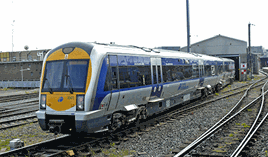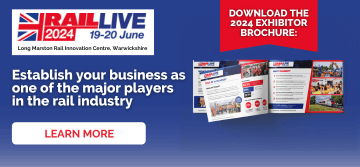Construcciones y Auxiliar de Ferrocarriles (CAF) built the Class 332s for Heathrow Express at its Zaragoza factory located between Madrid and Barcelona. These were built in 1997-1998, with additional vehicles delivered in 2002. Additionally, Class 333s were delivered to Northern Spirit in 2001. These were almost identical to Class 332s, but with a modified interior layout.
“What has CAF done since Heathrow Express?”
That’s a question CAF Business Development Director Richard Garner hears often. However, he takes it in his stride - as well he should, when considering the Spanish company’s business.
There are numerous other contracts in the UK for which CAF has delivered vehicles. For example, between 2009 and 2011, 27 seven-section trams were built for Edinburgh. The Edinburgh trams are from the Urbos range of trams and were built in Irun (northern Spain), around 20 miles from CAF’s headquarters. This was at a time when the Edinburgh Trams project was in difficulty and facing the risk of cancellation, however CAF still delivered to the required timescale and within the budget.
More recently, CAF has also delivered 21 five-section Urbos trams for Midland Metro.
In Northern Ireland, you’ll see plenty of CAF-built trains operating. The company was the last firm to deliver new diesel multiple units (DMUs) for the UK market, with 20 Class 4000 ‘C4K’s’ entering traffic with Northern Ireland Railways in 2011-2012. These 90mph three-car DMUs followed an order for 23 three-car DMUs (Class 3000s) that CAF delivered in 2004-2005. Both fleets were delivered within a time period of two years following contract award.
Iarnród Éireann also uses Mk 4 carriages built by CAF. In 2004-2005 seven eight-car trainsets were built, with 422 seats in each. These entered traffic in 2006 and are used between Dublin and Cork. They operate with a Driving Van Trailer and are capable of 125mph.
In May 2014, Serco was awarded the Caledonian Sleeper franchise. This included a deal for 75 new bespoke Mk v5 sleeper coaches that will enter service in 2018. CAF will build these at its main headquarters located in Beasain, near Bilbao.
Garner explains about the Beasain factory:
“The facility not only manufactures vehicles, it is also the centre of excellence for many of the vehicles’ sub-systems, including the bogies. We manufacture bogies here for all the other CAF factories worldwide. When you walk through the fabrication shop, there could easily be 14 different bogie projects in progress.
“Beasain has the ability to manufacture steel and aluminium car bodies and facilities for painting, finishing as well as testing a range of vehicles, with a variety of European or worldwide power requirements including 750 DC, 1500 AC and 25kV AC. Last week there were six different contracts, with 20 different vehicles being tested.”
The company has grown enormously since the last Heathrow Express trains were delivered in 1999. At that time, the turnover was 307 million euros. In 2011, it was 1,725 million euros (although by 2014 the figure had dipped slightly to 1,447 million euros, largely due to the difficult economic climate in Spain at that time). That fivefold increase is built largely on the export market - CAF has products in 33 countries and is involved in a total of 80 projects. New production facilities have also been developed in Bagnères de Bigorre in France, Elmira in USA, Mexico City and Sao Paulo in Brazil, to serve local customers.
The business is a listed corporation on the Madrid Stock Exchange, of which around 27% is owned through employee participation with a further 19% owned by savings bank participation, through locally based building societies. This 46% ownership ensures the employees have a direct interest in the success of the business.
Says Garner: “CAF supplies rolling stock but we also have other divisions such as CAF Transport Engineering - a civil engineering, systems, electrification and integration company, as well as CAF Signalling - a company supplying signalling and control systems, including an on-board ETCS solution called AURIGA, NAOS integrated control centres platform and QUASAR S4e, an electronic interlocking. Drivers cab simulators are also manufactured by another CAF subsidiary - LANDER.
“NEM Solutions is partially owned by CAF and provides asset management solutions. The company provides complete management solutions to businesses responsible for the operation and maintenance of rolling stock fleets.
“To achieve this, NEM Solutions determines the future behaviour of vehicle systems based on daily generated operations and maintenance data, extending life cycles, improving productivity and generating system knowledge of high value. This capability provides the tools and processes for cost reductions in maintenance and operation, and performance increases in system reliability and availability.
“Specialist independent testing is undertaken by CETEST, which is based adjacent to CAF in Beasain. They focus on testing vehicles, at the factory, at the test track or on the premises of our customers. CETEST is a fully accredited independent test laboratory offering services for design verification, model validation, developmental testing and investigations to identify failure root causes. We are sure there are interesting opportunities to introduce CETEST into the UK market.”
CAF is essentially a vertically integrated manufacturer with around 80% of a typical train being provided by one of the CAF Group of companies. This not only creates an efficient delivery model, it also allows total control of the most critical aspects of the supply chain.
Garner adds: “To give you an idea of scale, a comprehensive walk around the factory covers a distance of 12.5km taking three hours with an abridged tour taking two and a half hours. It is comparable to the distance from Wembley stadium in North London to Twickenham rugby stadium in South West London.
“We’re very much a long-term prospect. Over the recent years, we’ve invested around 500 million euros back into the company and its manufacturing facilities. That’s driven by taking a long-term view and ensuring that our investment is very much about taking us to where we want to be in the next ten years.
“But it’s not just about machinery, the company takes a long-term view when it comes to the employees. CAF is a company of choice, we invest in our people and most expect to work for the company for the whole of their career. The number of employees across the group is around 8,000. We have the pick of the graduates from universities and a high percentage of engineers, technicians and skilled labour.”
The company is performing well, with current orders exceeding five billion euros. Garner says: “In terms of vehicles, that translates itself to around two to three years’ future production and includes an 800 million euro contract for the supply of EMUs for the Dutch market.”
As for the different opportunities available for train builders in the UK market these days, Garner tells RAIL: “These are exciting times. We have been and are involved with all of the recent major rolling stock procurement projects. When you look at Crossrail and the Deep Tube projects, the pre-qualification stage alone is designed to only engage the serious competitors. For these projects you need to be able to demonstrate worldwide experience.”
Regarding work going forward, what can CAF deliver?
Garner recognises that there is an ageing fleet in the UK: “If you take the report produced by the Rail Delivery Group, there’s a clear requirement for the replacement of ageing rolling stock, combined with the growth in the passenger numbers, and the trend doesn’t look like it’s slowing down.















Comment as guest
Comments
No comments have been made yet.